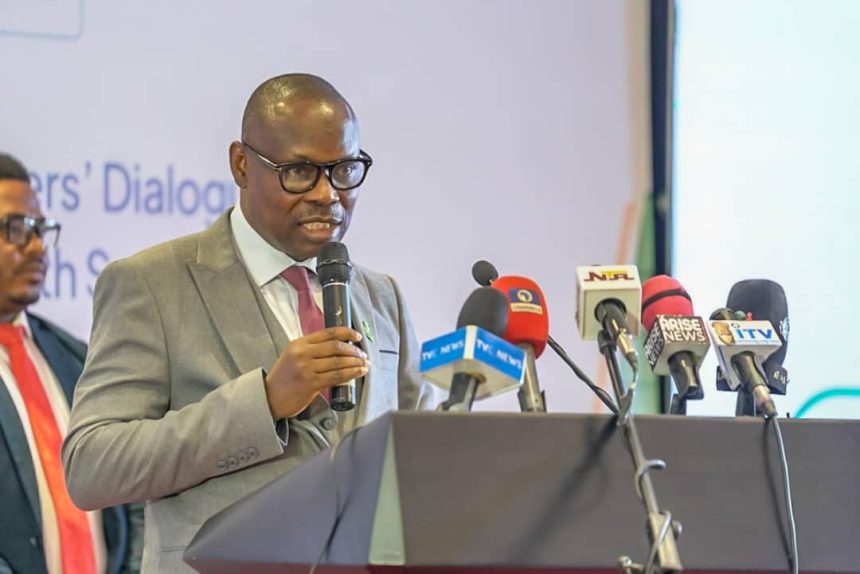A survey conducted by Sustainable Energy for All in 2021 shows that 40% of functional Primary Health Care facilities in Nigeria do not have access to electricity, with the majority of the remaining 60% receiving not more than 10 hours of daily power supply from various sources.
The Minister of State for Health and Social Welfare, Dr. Iziaq Adekunle Salako, while speaking at the National Stakeholders Dialogue on Power in the Health Sector, also cited a survey conducted by BudgIT, which revealed that health workers identified access to reliable electricity as the second leading barrier to improved healthcare delivery in Nigeria.
The Dialogue themed, “Powering Health Through Public-Private Synergy: Energising Nigeria’s Health Sector For the Future”
While speaking further, Salako also raised concerns over the deplorable state of energy supply in Nigeria’s healthcare facilities, describing it as a major disruptor of health services in the country.
The Minister noted that Federal Tertiary Health Institutions require between 3 to 8 MW of energy to function optimally, but receive an average of 5.3 hours of daily electricity from the national grid.
He also stated that these institutions spend between 20 to 180 million Naira per month on fuel to power their backup generators.
Salako stressed that the current situation requires a collaborative whole-of-government approach to resolve the challenging issues that are beyond the purview of the health sector.
He called for mobilising social impact investments and other innovative funding from the private sector to protect the social good agenda of the health sector.
“The time has come for us to jointly take stock and put all hands on deck to address the access and quality-limiting effects of energy poverty in our health sector,”
Salako said. “We must explore and come up with concrete and diverse financing models to attract the necessary capital and ensure the viability of these projects.”
The Minister expressed optimism that the National Stakeholders Dialogue on Power in the Health Sector would yield actionable outcomes, including a collaborative action plan to comprehensively address the power challenge in Nigeria’s healthcare facilities.
Salako commended the Federal Ministry of Power and other stakeholders for their efforts to electrify healthcare facilities across the country and called for continued collaboration to achieve the desired results.
“Let’s work together to make a difference,” Dr. Salako urged. “The Health Sector Renewal Investment Initiative is headed in the right direction, and with the commitment of President Bola Ahmed Tinubu, we can transform healthcare in our country.”
Also speaking, the Permanent Secretary, Ministry of Power, Mahmuda Mamman, said unreliable electricity undermined healthcare delivery, interrupted essential procedures, endangered patient safety and increased operational costs.
“Our drive to Universal Health Coverage and Sustainable Development Goals will be unattainable unless we decisively close the energy gaps in the health sector through innovative strategies and investments.
“The ministry aims to ensure a nationwide uninterrupted, clean and affordable power supply to health institutions,” he said.
Mamman listed initiatives such as the Nigerian Energy Transition Plan, decentralised solar systems for schools and health centres, Rural Electrification Projects, and energy efficiency programmes in public buildings as part of efforts to power critical health facilities.
In her welcome remarks, the Permanent Secretary, Ministry of Health and Social Welfare, Daju Kachollom, said the theme of the dialogue captured the government’s mission to ensure that every Nigerian, regardless of geography or circumstance, had access to affordable and quality healthcare supported by sustainable power.
“We know too well the reality: when there is no electricity, maternal care is endangered, life-saving surgeries are delayed, vaccines lose potency, and digital health systems are disrupted.
“Power in health is not an abstract infrastructure issue; it is a matter of life, of dignity, and of hope,” she said.
Kachollom noted that the high point of the dialogue would be the signing of a historic multi-stakeholder compact, uniting government, development partners, private sector, civil society, and innovators in a shared vision to ensure that no health facility in Nigeria was left in the dark.
The dialogue will chart pathways to unlock innovative financing, scale climate-smart energy solutions, strengthen governance and accountability, and ensure that rural and underserved communities are not left behind.
ALSO READ TOP STORIES FROM NIGERIAN TRIBUNE
WATCH TOP VIDEOS FROM NIGERIAN TRIBUNE TV
- Let’s Talk About SELF-AWARENESS
- Is Your Confidence Mistaken for Pride? Let’s talk about it
- Is Etiquette About Perfection…Or Just Not Being Rude?
- Top Psychologist Reveal 3 Signs You’re Struggling With Imposter Syndrome
- Do You Pick Up Work-Related Calls at Midnight or Never? Let’s Talk About Boundaries






